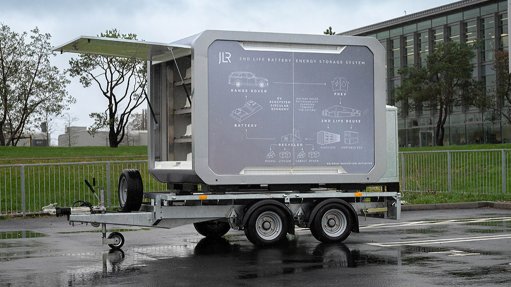Industry-aligned curricula, work readiness needed to close skills gap in automotive components sector
A research study on skills in the automotive components sector shows that technical vocational education and training (TVET) institutions and technical universities must develop industry-aligned curricula and must produce work-ready candidates to close the skills gap in the sector.
More than 70% of the respondents who participated in the inaugural 'High Gear Quarterly Skills Survey' said their organisations face a skills gap within the artisan, skilled and leadership occupation categories, with the most pressing current and potential future skills gaps being digital, complex problem-solving and technical skills.
The study was undertaken by industry body the National Association of Automotive Component and Allied Manufacturers (Naacam) and the Department of Higher Education and Training to strengthen the market relevance of select TVET courses.
Further imperatives necessary to produce suitable candidates for the industry include improved lecturer awareness of industry requirements and expanded student access to workplaces for practical training.
Concurrently, more emphasis must be placed on active teaching and learning methods, with less rote learning, and TVET institutions must improve career guidance services for engineering and trade students, Naacam suggests.
"These interventions, however, should be used together to achieve the objective of creating a sustainable pipeline of skilled graduates that support the industry’s ambitions."
More than 75% of respondents indicated that their organisations face a skills gap within the artisan and skilled occupation grouping.
"For the most part, the trends remained constant for subsectors. More than 80% of all plastic moulding and extrusion, metal forming and pressing, just-in-time assembly, tyre and precision machining companies reported a skills gap among artisans," Naacam says in the report.
The main reasons given by respondents for skills gaps are that candidates do not have the right experience, with 64.44% of companies surveyed stating this, and new technology entering the industry, with 55.56% of respondents agreeing.
Further, 48.89% said qualifications are not aligned with industry, while new processes, as stated by 44.44%, are also contributing to skills gaps.
Additionally, 42.22% of respondents said candidates lack the right qualifications.
"Additional comments received note personal qualities, such as a lack of passion and work ethic, and structural issues, including the lack of access to quality education for all and the lack of comprehensive qualifications, as contributing causes of the existing skills gaps," Naacam notes in the report.
"Respondents indicated two core solutions to address the existing and likely future skills gaps, with about 35% of respondents averring that attention needs to be placed on the technical and practical training graduates receive during their tertiary education. Along with this, taught courses need to be better aligned to industry requirements.
"A further 34% of respondents suggest that practical dual-vocational training is needed to close skills gaps, rather than only using classroom practical activities. Experience within a manufacturing environment will equip individuals with the skills to apply their classroom-taught technical skills in a real-life operational environment.
"Dual-vocational training will develop graduates with the correct skills, maturity and expectations to excel in their careers."
Other training mentioned includes greater soft skills and supervisory training, as well as improved career guidance to ensure individual graduates are entering professions they are both passionate about and capable of doing, the association said.
Despite respondents indicating that artisans and leadership are the two critical occupation levels at which skills gaps are being experienced, 86% of respondents strongly indicated that TVET colleges should focus on developing a pipeline of artisan graduates, followed by semiskilled graduates, with 60% stating this.
Less than 30% of companies believe TVETs should focus on developing leadership and professionals.
"The same, however, does not apply to universities of technology. Here, 77.8% of companies indicated that universities of technology should prioritise training those at a professional level. Further, 60% and 53.3% of companies also want universities of technology to build the pipeline of artisans and leadership personnel, respectively."
Naacam points out that the High Gear survey is aimed at demonstrating a model for greater industry involvement in TVET course design and delivery that generates enthusiasm from TVET educators and industry, while also generating positive benefits for young people and employers.
"Only 40% of respondents have confidence in TVET colleges, although 60% have confidence in universities of technology. There is some variation in this trend, with 20% of KwaZulu-Natal companies and 63% of Western Cape companies indicating confidence in their TVET colleges. Companies with a presence in East London show greater confidence in TVETs (44%) than universities of technology (33%)."
"The results of the survey clearly indicate substantial technical and soft skills gaps exist across the automotive component industry. The cause of these gaps is predominately linked to graduates not having the correct experience when entering the workplace.
"This is partially owing to TVET courses not being correctly aligned to the needs of industry and the continuously changing technology and manufacturing processes used within the industry."
Numerous interventions were suggested to support the creation of a sustainable pipeline of skilled graduates entering the automotive component industry. Importantly, it is suggested that students and lecturers receive greater technical training and that dual vocational training be adopted, Naacam says.
"High Gear is taking steps to create a demand-driven TVET system that offers quality courses that are aligned with industry, including designing industry-validated TVET course upgrades, equipping TVET lecturers to deliver upgraded courses, facilitating workplace exposure for both TVET lecturers and students, and supporting the creation of a career experience platform to provide students with sound career guidance regarding jobs in the industry."
Interventions to improve the quality of graduates need to be holistic and tackle education at all levels. TVET institutions must offer students greater practical experience and soft-skills development, as well as ensure lecturers receive greater workplace exposure. Curriculum must be continuously reviewed, the report states.
"Interventions to create a strong pipeline of skilled graduates need to focus not only on bolstering TVET courses, but also ensuring that basic education curriculum content and delivery is optimised to support the learning outcomes of tertiary education," Naacam says in the report.
FUTURE SKILLS
Minimal change in the composition of these priority skills gaps is expected in the future with digital skills, complex problem solving and technical skills remaining the highest priority skills gaps, both currently and in the future.
"To ensure the stability of South Africa’s automotive component sector, current and potential future skills gaps must be addressed before the supply chain is placed in danger.
"The automotive sector faces frequent technological advancement and, thus, questions arise regarding the importance of current skills in the future, and whether new skills requirements will arise. Respondents largely indicated they anticipated minimal change between their current skills gaps and likely future skills gaps."
On average, gaps within digital skills, which are already a high priority for most companies, are expected to become more critical in the coming years.
Comments
Announcements
What's On
Subscribe to improve your user experience...
Option 1 (equivalent of R125 a month):
Receive a weekly copy of Creamer Media's Engineering News & Mining Weekly magazine
(print copy for those in South Africa and e-magazine for those outside of South Africa)
Receive daily email newsletters
Access to full search results
Access archive of magazine back copies
Access to Projects in Progress
Access to ONE Research Report of your choice in PDF format
Option 2 (equivalent of R375 a month):
All benefits from Option 1
PLUS
Access to Creamer Media's Research Channel Africa for ALL Research Reports, in PDF format, on various industrial and mining sectors
including Electricity; Water; Energy Transition; Hydrogen; Roads, Rail and Ports; Coal; Gold; Platinum; Battery Metals; etc.
Already a subscriber?
Forgotten your password?
Receive weekly copy of Creamer Media's Engineering News & Mining Weekly magazine (print copy for those in South Africa and e-magazine for those outside of South Africa)
➕
Recieve daily email newsletters
➕
Access to full search results
➕
Access archive of magazine back copies
➕
Access to Projects in Progress
➕
Access to ONE Research Report of your choice in PDF format
RESEARCH CHANNEL AFRICA
R4500 (equivalent of R375 a month)
SUBSCRIBEAll benefits from Option 1
➕
Access to Creamer Media's Research Channel Africa for ALL Research Reports on various industrial and mining sectors, in PDF format, including on:
Electricity
➕
Water
➕
Energy Transition
➕
Hydrogen
➕
Roads, Rail and Ports
➕
Coal
➕
Gold
➕
Platinum
➕
Battery Metals
➕
etc.
Receive all benefits from Option 1 or Option 2 delivered to numerous people at your company
➕
Multiple User names and Passwords for simultaneous log-ins
➕
Intranet integration access to all in your organisation


















